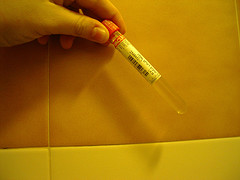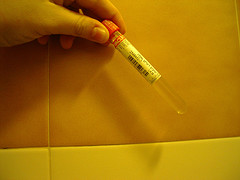Random drug testing in Wyoming middle and high schools challenged

Middle and high school athletes, cheerleaders, band members and others at Goshen County public schools in Wyoming must sign a form agreeing to random, suspicionless drug testing. The district’s new policy was passed in April, 2009.
A group of students and parents who oppose the policy filed a lawsuit in July. They claim it violates the students’ rights guaranteed under the 4th and 14th Amendments. The Fourth Amendment protects each of us against unreasonable searches and seizures. They assert that submitting to a urine test without any suspicion of drug use by the student is unreasonable.

Photo by Ella Novak (Flickr)
The 14th Amendment guarantees all citizens equal protection – that we’re all treated the same. Their argument here is that under the drug testing policy, students who participate in extra-curricular activities at school must test while those who don’t are free from the policy.
The issue of drug testing at school is not new. The practice has been challenged since the early 1990’s when 12-year-old James Acton of Oregon refused to sign the agreement in order to play football. After a four-year court battle, the U.S. Supreme Court said that the school’s policy, as applied to athletes, was reasonable and constitutional. The court considered the issue of student privacy and the school’s job of keeping its campus safe and drug-free for all students.
Then in 2002, the Supreme Court decided another drug testing challenge filed by Lindsay Earls, a high school student in Oklahoma. Lindsay was not an athlete but a member of the choir, marching band and National Honor Society. She tested negative but opposed the policy as humiliating and accusatory. The Court again upheld the policy, now extended to extracurricular activities at school. It ruled that school districts have an “important interest in preventing and deterring drug use among its schoolchildren.”
What do you think of being tested in order to participate at school in sports, clubs, or any other activity? Do you think it is such an invasion of privacy that it should be banned? What about a policy that covers all students, regardless of whether they’re in sports, clubs or not? In the Earls case in 2002, Justice Ruth Bader Ginsburg hinted at such a policy.
For more about random drug testing at school, see: http://askthejudge.info/do-i-have-to-take-a-drug-test/45/



per a group of five teen boys, they feel that the schools should have probable cause to test the students, athletees or not